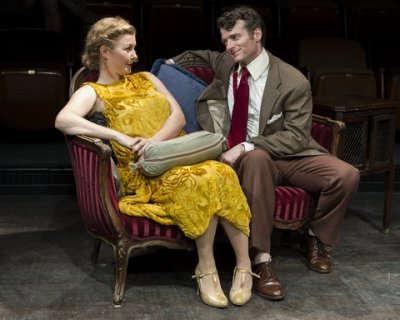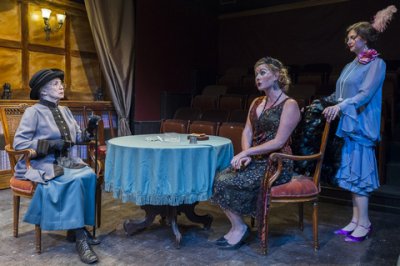The Awful Truth
Original play which led to the famous screwball classic of the 1930’s turns out to be a drawing room comedy instead.

Alexandra O’Daly and Nate Washburn in a scene from “The Awful Truth” (Photo credit: Jacob J. Goldberg)
[avatar user=”Victor Gluck” size=”96″ align=”left” ] Victor Gluck, Editor-in-Chief[/avatar] Divorced socialite Lucy Warriner has agreed to marry Texas oil tycoon Deniel Leeson. Her friends don’t know what she sees in the unsophisticated country hick but her divorce has left her cash poor and on the loose. However, his aunt on whom he relies isn’t convinced that Lucy is the right wife for Dan. First of all, although Lucy divorced ex-husband Norman Satterley as being the injured party, rumors have persisted that Norman had evidence of Lucy’s infidelity while they were married. The only person who can vouch for her is Norman himself but can Lucy convince him to do it? And what is the truth about the rumors? Lucy declares herself innocent of the idle gossip.
If this story sounds familiar, it is the plot of the classic thirties screwball comedy The Awful Truth which starred Cary Grant and Irene Dunne. In fact, Arthur Richman’s 1922 play of the same name has been filmed four times including a 1925 silent version, a 1929 sound version with original stage star Ina Claire which has been lost, and a 1953 musical version with Jane Wyman and Ray Milland. As part of its 24th Season devoted to “Hope,” Metropolitan Playhouse is producing the first New York revival of this unpublished play, surprisingly as the original production ran a successful 144 performances.
The play now has the same problem as such works as Green Grow the Lilacs, Liliom, and Pygmalion. Once you know the more famous expanded versions (Oklahoma!, Carousel and My Fair Lady, respectively), the earlier plays seem rather thin and diminished by comparison. Richman’s The Awful Truth turns out to be a drawing room comedy, while the movie was turned into a classic of the screwball genre thanks to director Leo McCarey (Duck Soup, Ruggles of Red Gap, The Milky Way) and screenwriters Vina Delmar and Sidney Buchman. Not only does the stage version seem dated, it also doesn’t have the wit of the film to compensate. While the play has historic importance as one of the first to deal with divorcees as liberated women, its lack of real wit makes it a minor comedy of its era. Where the 1937 movie wisely added a great deal of physical comedy, the stage version continues to harp on the question of whether Lucy was faithful or not – long past the audience’s caring about the issue.
Michael Hardart’s direction is urbane and sophisticated but makes some strange choices. As played by Alexandra O’Daly, Lucy continually seems to be guilty – rather than ambiguous or falsely accused. Her treatment of her out-of-town fiancé is so blatant one wonders why he stays around. In the Cary Grant role of the ex-husband, Nate Washburn seems on the verge of bursting out laughing at any moment which diminishes his character, rather than suggests that he is also playing the game. Oil tycoon Dan Leeson ought to be a hardy outdoors type, but J. Stephen Brantley plays him as though he were a dull accountant or lawyer which does not let us see what attracted Lucy to him in the first place – unless it was only his money.

Emily Jon Mitchell, Alexandra O’Daly and Erin Leigh Schmoyer in a scene from “The Awful Truth” (Photo credit: Jacob J. Goldberg)
The rest of the cast is equally one-dimensional: as the old-fashioned Puritanical Mrs. Leeson, Emily Jon Mitchell is so obvious that she leaves no room for doubt. Mark August as the man with whom Lucy may or may not have had an affair is too dry to be convincing as a man to attract her attention, even if her husband was guilty of ignoring her. Benjamin Russell and Erin Leigh Schmoyer as friends of Lucy and Norman are played as inconsequential socialites, rather than people who have a great deal of influence over her.
The production team has been much more successful. Alex Roe’s two sets cleverly make use of the three-sided theater to create two different elegant interiors. Costume designer Sidney Fortner, another longtime Metropolitan Playhouse regular, has created an attractive collection of upper class twenties clothing. The bright lighting designed by Christopher Weston is entirely suitable for the well-appointed rooms of the rich.
The Metropolitan Playhouse continues to fulfill its mission to track down and uncover plays of America’s literary past worth a second look. The Awful Truth, while offering some diversion in the form of clever repartee, is now mainly of interest only as the source material for the classic Hollywood movie.
The Awful Truth (through October 18, 2015)
Metropolitan Playhouse, 220 East 4th Street, in Manhattan
For tickets, call 800-838-3006 or visit http://www.MetropolitanPlayhouse.org
Running time: two hours including one intermission






Leave a comment